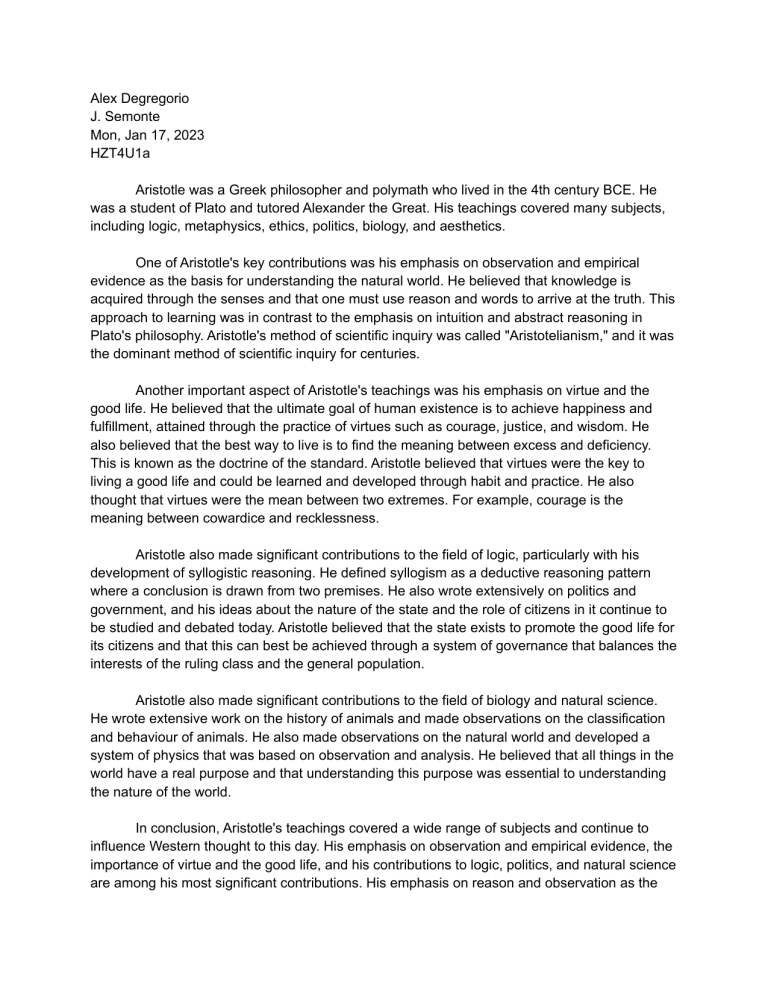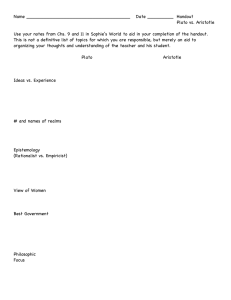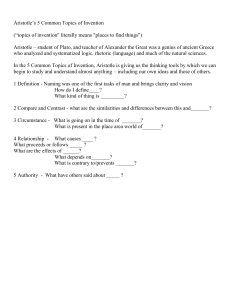Aristotle's Philosophy: Key Contributions & Teachings
advertisement

Alex Degregorio J. Semonte Mon, Jan 17, 2023 HZT4U1a Aristotle was a Greek philosopher and polymath who lived in the 4th century BCE. He was a student of Plato and tutored Alexander the Great. His teachings covered many subjects, including logic, metaphysics, ethics, politics, biology, and aesthetics. One of Aristotle's key contributions was his emphasis on observation and empirical evidence as the basis for understanding the natural world. He believed that knowledge is acquired through the senses and that one must use reason and words to arrive at the truth. This approach to learning was in contrast to the emphasis on intuition and abstract reasoning in Plato's philosophy. Aristotle's method of scientific inquiry was called "Aristotelianism," and it was the dominant method of scientific inquiry for centuries. Another important aspect of Aristotle's teachings was his emphasis on virtue and the good life. He believed that the ultimate goal of human existence is to achieve happiness and fulfillment, attained through the practice of virtues such as courage, justice, and wisdom. He also believed that the best way to live is to find the meaning between excess and deficiency. This is known as the doctrine of the standard. Aristotle believed that virtues were the key to living a good life and could be learned and developed through habit and practice. He also thought that virtues were the mean between two extremes. For example, courage is the meaning between cowardice and recklessness. Aristotle also made significant contributions to the field of logic, particularly with his development of syllogistic reasoning. He defined syllogism as a deductive reasoning pattern where a conclusion is drawn from two premises. He also wrote extensively on politics and government, and his ideas about the nature of the state and the role of citizens in it continue to be studied and debated today. Aristotle believed that the state exists to promote the good life for its citizens and that this can best be achieved through a system of governance that balances the interests of the ruling class and the general population. Aristotle also made significant contributions to the field of biology and natural science. He wrote extensive work on the history of animals and made observations on the classification and behaviour of animals. He also made observations on the natural world and developed a system of physics that was based on observation and analysis. He believed that all things in the world have a real purpose and that understanding this purpose was essential to understanding the nature of the world. In conclusion, Aristotle's teachings covered a wide range of subjects and continue to influence Western thought to this day. His emphasis on observation and empirical evidence, the importance of virtue and the good life, and his contributions to logic, politics, and natural science are among his most significant contributions. His emphasis on reason and observation as the basis of knowledge marked a considerable departure from the intuition-based approach of his teacher Plato, and his focus on virtue and the good life continues to be an essential aspect of Western philosophy. Aristotle's work continues to be studied and debated, and his ideas continue to shape our understanding of the world around us.





